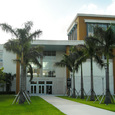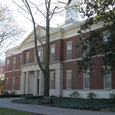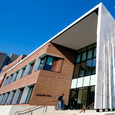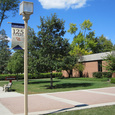How'd They Do It? Law Schools With Top Bar Pass Rates Share Their Secrets
Five law schools share how their graduates dominate when it comes to passing the bar exam.
November 07, 2019 at 01:18 PM
6 minute read
We've asked five law schools with the highest July pass rate in their respective jurisdictions to tell us about their secrets to bar exam success, and why their graduates tend to do so well on the licensing exam.
Most jurisdictions have released the results of the July 2019 bar exam, and the news is largely positive. Pass rates went up in most states, though closely watched California likely won't release results for another week or so.
Here are the top performers in their states: Florida International University College of Law (overall pass rate of 96%); Baylor University School of Law (93% first-time pass rate); the University of Georgia School of Law (94% first-time pass rate); the University of Pennsylvania Law School (88% overall pass rate); and Ohio Northern University Pettit College of Law (100% first-time pass rate.)
 Florida International University College of Law: First, FIU Law implemented a unique program designed to teach students how to teach themselves. This promotes success not only in law school and the bar exam, but in the practice of law as well. While eschewing "teaching to the test," the Academic Excellence Program, led by Associate Dean, Professor Louis Schulze, and Assistant Dean, Professor Raul Ruiz, uses sophisticated data analyses to support students and capitalizes on cutting-edge methods from educational psychology and cognitive science. Second, our faculty consistently delivers a rigorous curriculum that includes not only substantive knowledge of legal doctrine but also emphasizes the development of practical skills. Our low student faculty ratio, particularly in first year legal writing, enables all first-year students to interact intensively with their professors. Third, and most importantly, our students are incredibly hard-working. Data show that they lead the state in terms of completion percentage in bar preparation. It is that diligence and perseverance that truly leads to our students' remarkable success. The faculty and students have created a culture at FIU Law that fosters excellence. — Antony Page, dean.
Florida International University College of Law: First, FIU Law implemented a unique program designed to teach students how to teach themselves. This promotes success not only in law school and the bar exam, but in the practice of law as well. While eschewing "teaching to the test," the Academic Excellence Program, led by Associate Dean, Professor Louis Schulze, and Assistant Dean, Professor Raul Ruiz, uses sophisticated data analyses to support students and capitalizes on cutting-edge methods from educational psychology and cognitive science. Second, our faculty consistently delivers a rigorous curriculum that includes not only substantive knowledge of legal doctrine but also emphasizes the development of practical skills. Our low student faculty ratio, particularly in first year legal writing, enables all first-year students to interact intensively with their professors. Third, and most importantly, our students are incredibly hard-working. Data show that they lead the state in terms of completion percentage in bar preparation. It is that diligence and perseverance that truly leads to our students' remarkable success. The faculty and students have created a culture at FIU Law that fosters excellence. — Antony Page, dean.
 Baylor University School of Law: At Baylor Law, the workload starts out being challenging, and it becomes even more challenging as a student progresses through the curriculum to the third year. At most law schools the curriculum significantly eases in the second and third years, which are comprised of largely elective credits. At Baylor Law, each year is increasingly difficult, culminating in the universally regarded "toughest" third year. Over 60% of the credits necessary for graduation are required courses. For example, Baylor Law has twice as many required legal-writing credits as most schools, and a Baylor Law student takes at least 17 required experiential learning credits, almost three times what the American Bar Association requires. Baylor Law has the reputation as one of the most rigorous law programs in the nation and as one that gets its graduates ready to pass the bar exam and to excel in practice. The results of this highly distinctive approach to legal education can indeed be seen in our students' performance on the Texas Bar Exam, an exam on which our historical success is unsurpassed. Because we genuinely challenge our students throughout the program, they are prepared for the realities of law practice as well as the bar exam. — Jim Wren, professor.
Baylor University School of Law: At Baylor Law, the workload starts out being challenging, and it becomes even more challenging as a student progresses through the curriculum to the third year. At most law schools the curriculum significantly eases in the second and third years, which are comprised of largely elective credits. At Baylor Law, each year is increasingly difficult, culminating in the universally regarded "toughest" third year. Over 60% of the credits necessary for graduation are required courses. For example, Baylor Law has twice as many required legal-writing credits as most schools, and a Baylor Law student takes at least 17 required experiential learning credits, almost three times what the American Bar Association requires. Baylor Law has the reputation as one of the most rigorous law programs in the nation and as one that gets its graduates ready to pass the bar exam and to excel in practice. The results of this highly distinctive approach to legal education can indeed be seen in our students' performance on the Texas Bar Exam, an exam on which our historical success is unsurpassed. Because we genuinely challenge our students throughout the program, they are prepared for the realities of law practice as well as the bar exam. — Jim Wren, professor.
 University of Georgia School of Law: The University of Georgia School of Law relentlessly pursues a vision to be the nation's best return on investment in legal education; bar passage success is an essential element of this vision. The entire law school community is laser-focused on assisting our students throughout their legal education. The Bar Passage Working Group undertakes regular data-driven analyses of exam results. The Bar Exam Success Team supports our recent graduates as they prepare for bar examinations and provides a sense of community during this critical time. From pairing individuals with study partners who check in throughout the summer after graduation to holding events at the law school for those who are on campus studying, the BEST team offers ways to ensure future exam takers are focused and accountable as they prepare for bar exams. Additionally, the law school is incredibly grateful for support from its alumni community that has supported a bar preparation stipend for those in need. These stipends not only provide study assistance to our community members, but also advance our goal to ensure that a legal education is affordable to anyone who wishes to study law. — Peter B. "Bo" Rutledge, dean.
University of Georgia School of Law: The University of Georgia School of Law relentlessly pursues a vision to be the nation's best return on investment in legal education; bar passage success is an essential element of this vision. The entire law school community is laser-focused on assisting our students throughout their legal education. The Bar Passage Working Group undertakes regular data-driven analyses of exam results. The Bar Exam Success Team supports our recent graduates as they prepare for bar examinations and provides a sense of community during this critical time. From pairing individuals with study partners who check in throughout the summer after graduation to holding events at the law school for those who are on campus studying, the BEST team offers ways to ensure future exam takers are focused and accountable as they prepare for bar exams. Additionally, the law school is incredibly grateful for support from its alumni community that has supported a bar preparation stipend for those in need. These stipends not only provide study assistance to our community members, but also advance our goal to ensure that a legal education is affordable to anyone who wishes to study law. — Peter B. "Bo" Rutledge, dean.
 University of Pennsylvania Law School: Penn Law combines a rigorous curriculum with continuous education and support for the skills we believe are the key to success in law school, the bar exam, and beyond. Penn Law's student affairs, academic support, professionalism, and career planning professionals engage in a collaborative effort to design a holistic approach to lawyer development. Penn Law blends co-curricular programming with individual instruction on critical legal thinking and reading, exam-taking skills, and professional identity formation. This comprehensive suite of programming complements and strengthens students' educational experience and ensures Penn Law graduates are thoroughly equipped to transition to the profession and succeed in a competitive job market. — Jessica Pollock Simon, director of academic support.
University of Pennsylvania Law School: Penn Law combines a rigorous curriculum with continuous education and support for the skills we believe are the key to success in law school, the bar exam, and beyond. Penn Law's student affairs, academic support, professionalism, and career planning professionals engage in a collaborative effort to design a holistic approach to lawyer development. Penn Law blends co-curricular programming with individual instruction on critical legal thinking and reading, exam-taking skills, and professional identity formation. This comprehensive suite of programming complements and strengthens students' educational experience and ensures Penn Law graduates are thoroughly equipped to transition to the profession and succeed in a competitive job market. — Jessica Pollock Simon, director of academic support.
 Ohio Northern University Pettit College of Law: ONU Law's extraordinary results reflect our graduates' hard work, dedication, and focus in preparing for the exam. Our administration and faculty are committed to training students to become lawyers through a rigorous first-year curriculum, high quality teaching, and experiential learning. With our low 6:1 student-to-faculty ratio, we are able to provide individual attention to each student. ONU Law has an intentional through line of Academic Success programming. It begins on day one of law school with two first-year courses dedicated to developing analytical skills. The programming continues during the second year and culminates in the third year with a "Transition to Practice" course taught by Professor Nancy Sabol, during which students learn how to effectively write bar exam essays and answer MBE questions. Our two-person Academic Success team gives personalized attention and timely feedback to each student throughout all Academic Success courses, and throughout the summer as graduates prepare for the exam. — Nancy Sabol, director of academic success and associate professor.
Ohio Northern University Pettit College of Law: ONU Law's extraordinary results reflect our graduates' hard work, dedication, and focus in preparing for the exam. Our administration and faculty are committed to training students to become lawyers through a rigorous first-year curriculum, high quality teaching, and experiential learning. With our low 6:1 student-to-faculty ratio, we are able to provide individual attention to each student. ONU Law has an intentional through line of Academic Success programming. It begins on day one of law school with two first-year courses dedicated to developing analytical skills. The programming continues during the second year and culminates in the third year with a "Transition to Practice" course taught by Professor Nancy Sabol, during which students learn how to effectively write bar exam essays and answer MBE questions. Our two-person Academic Success team gives personalized attention and timely feedback to each student throughout all Academic Success courses, and throughout the summer as graduates prepare for the exam. — Nancy Sabol, director of academic success and associate professor.
NOT FOR REPRINT
© 2025 ALM Global, LLC, All Rights Reserved. Request academic re-use from www.copyright.com. All other uses, submit a request to [email protected]. For more information visit Asset & Logo Licensing.
You Might Like
View All
The Met Hires GC of Elite University as Next Legal Chief

A Jury to Determine Whether Stairs Were Defectively Designed in Injury Case, State Appellate Court Rules
5 minute read
LSAT Administrator Sues to Block AI Tutor From Using ‘Famous, Distinctive’ Test Prep Materials
3 minute read
'Everything From A to Z': University GCs Tested by Legal, Financial, Societal Challenges
6 minute readTrending Stories
- 1'It's Not Going to Be Pretty': PayPal, Capital One Face Novel Class Actions Over 'Poaching' Commissions Owed Influencers
- 211th Circuit Rejects Trump's Emergency Request as DOJ Prepares to Release Special Counsel's Final Report
- 3Supreme Court Takes Up Challenge to ACA Task Force
- 4'Tragedy of Unspeakable Proportions:' Could Edison, DWP, Face Lawsuits Over LA Wildfires?
- 5Meta Pulls Plug on DEI Programs
Who Got The Work
Michael G. Bongiorno, Andrew Scott Dulberg and Elizabeth E. Driscoll from Wilmer Cutler Pickering Hale and Dorr have stepped in to represent Symbotic Inc., an A.I.-enabled technology platform that focuses on increasing supply chain efficiency, and other defendants in a pending shareholder derivative lawsuit. The case, filed Oct. 2 in Massachusetts District Court by the Brown Law Firm on behalf of Stephen Austen, accuses certain officers and directors of misleading investors in regard to Symbotic's potential for margin growth by failing to disclose that the company was not equipped to timely deploy its systems or manage expenses through project delays. The case, assigned to U.S. District Judge Nathaniel M. Gorton, is 1:24-cv-12522, Austen v. Cohen et al.
Who Got The Work
Edmund Polubinski and Marie Killmond of Davis Polk & Wardwell have entered appearances for data platform software development company MongoDB and other defendants in a pending shareholder derivative lawsuit. The action, filed Oct. 7 in New York Southern District Court by the Brown Law Firm, accuses the company's directors and/or officers of falsely expressing confidence in the company’s restructuring of its sales incentive plan and downplaying the severity of decreases in its upfront commitments. The case is 1:24-cv-07594, Roy v. Ittycheria et al.
Who Got The Work
Amy O. Bruchs and Kurt F. Ellison of Michael Best & Friedrich have entered appearances for Epic Systems Corp. in a pending employment discrimination lawsuit. The suit was filed Sept. 7 in Wisconsin Western District Court by Levine Eisberner LLC and Siri & Glimstad on behalf of a project manager who claims that he was wrongfully terminated after applying for a religious exemption to the defendant's COVID-19 vaccine mandate. The case, assigned to U.S. Magistrate Judge Anita Marie Boor, is 3:24-cv-00630, Secker, Nathan v. Epic Systems Corporation.
Who Got The Work
David X. Sullivan, Thomas J. Finn and Gregory A. Hall from McCarter & English have entered appearances for Sunrun Installation Services in a pending civil rights lawsuit. The complaint was filed Sept. 4 in Connecticut District Court by attorney Robert M. Berke on behalf of former employee George Edward Steins, who was arrested and charged with employing an unregistered home improvement salesperson. The complaint alleges that had Sunrun informed the Connecticut Department of Consumer Protection that the plaintiff's employment had ended in 2017 and that he no longer held Sunrun's home improvement contractor license, he would not have been hit with charges, which were dismissed in May 2024. The case, assigned to U.S. District Judge Jeffrey A. Meyer, is 3:24-cv-01423, Steins v. Sunrun, Inc. et al.
Who Got The Work
Greenberg Traurig shareholder Joshua L. Raskin has entered an appearance for boohoo.com UK Ltd. in a pending patent infringement lawsuit. The suit, filed Sept. 3 in Texas Eastern District Court by Rozier Hardt McDonough on behalf of Alto Dynamics, asserts five patents related to an online shopping platform. The case, assigned to U.S. District Judge Rodney Gilstrap, is 2:24-cv-00719, Alto Dynamics, LLC v. boohoo.com UK Limited.
Featured Firms
Law Offices of Gary Martin Hays & Associates, P.C.
(470) 294-1674
Law Offices of Mark E. Salomone
(857) 444-6468
Smith & Hassler
(713) 739-1250








